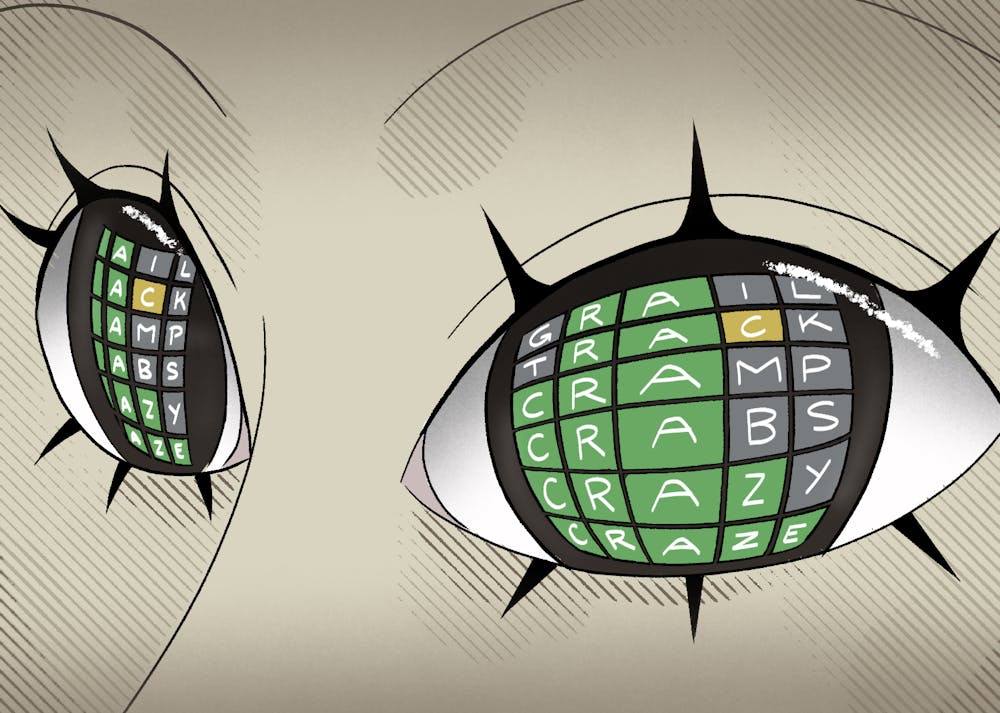Wordle, Connections, crosswords, sudoku. This string of free, online brain teasers plasters phone and computer screens across campus, briefly drawing students away from busy school days.
"It’s fun and it only takes like 20 seconds," said Nico Clayton, a sophomore studying Earth and environmental science.
Clayton referred to Wordle, a viral online game acquired by the New York Times in January of 2022 where a new five-letter word is released daily. Players have six chances to guess the correct word, receiving color-coordinated hints when they guess a letter correctly.
Clayton used to play Wordle regularly, even in class, during her freshmen year and had mastered a strategy by starting with the words quick, waltz and nymph. Now she plays the game less.
"Honestly, if the lecture was kind of boring, it was just something to do for a minute," Clayton said.
Part of the reason Clayton enjoyed Wordle was also because of its brainy nature.
"It counted to me as being smart," Clayton said.
Sofia Wyatt, a freshman studying computer science, plays Wordle and the word association game Connections every day, usually at midnight when the website releases new versions.
"Not intentionally, I’m just up," Wyatt said.
There is a slew of psychological factors behind the game Wordle’s success, including stimulation of the language and logic processing parts of the brain.
Wyatt enjoys word games in general. Beyond passing time, they said the games teach pattern recognition. For other students, the games provide an outlet to decompress.
Along with managing time and breaking tasks down, one tip that Sarah Tremmel, a sophomore studying public service and public policy and a lead Student Success Coach, recommends for students to "take time for themselves and do things that help them de-stress."
Tremmel, who mentors freshmen, said that first-year students encounter large amounts of stress while starting their time on campus.
"For a lot of them it’s because of academics," Tremmel said. "Students are also stressed because they're living away from home for the first time."
Freshman Kiera Mooney, who studies biological sciences, turns to online brain games for this exact purpose.
“It was very calming even though it's frustrating at some points,” Mooney said about her brain teaser of choice: Sudoku. “Like all brain teasers, it kind of takes me out of reality."
When it comes to incorporating brain teasers into the academic day, Tremmel finds pros and cons.
"I know that if you get obsessed with it, you might not have enough time to finish assignments that might be due at the end of the night," Tremmel said. "But I don't think that they're a bad thing. I think that some students need them."
Tremmel said that for students who have difficulty staying on task, playing a quick brain teaser might help them focus.
Like Clayton, Mooney admits that she has played brain teasers in class before.
"Sometimes it's harmful when I'm really checked out," she said. "But other times I feel like it helps me focus on what I'm supposed to be doing."
Another student success tip of Tremmel’s is to socialize and connect with other students. From her personal experience, she shared that she has done this with online brain teasers Wordle, Spelling Bee and the Mini Crossword from the New York Times Games.
"Me and my friends make it a competition a lot of the time," Tremmel said. "Who can finish the word first or in the least amount of tries? That's what makes it fun for me is the competition in it."
Ultimately, different students play different brain teasers for a variety of reasons. Tremmel said that when it comes to using the games to de-stress remember that "learning is not linear and there are so many different ways for you to study and for you to decompress."
"I think I go to it to find something outside of what I normally do, just to sit down and relax," Mooney said.
Edited by Claire van Doren, Sadie Buggle and Angelina Steel.
Reach the reporter at spbracci@asu.edu and follow @SophiaBraccio on X.
Like The State Press on Facebook and follow @statepress on X.
Sophia is a senior studying journalism and mass communication. This is her sixth semester with The State Press. She has also worked at Nomads with Notebooks and Blaze Radio and interned for The Arizona Republic.




